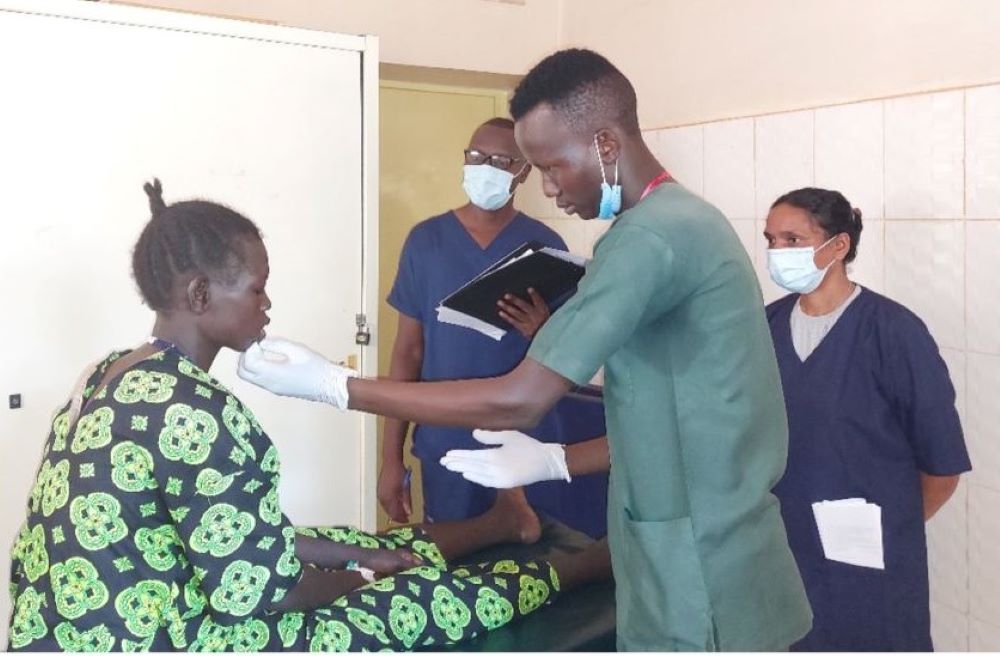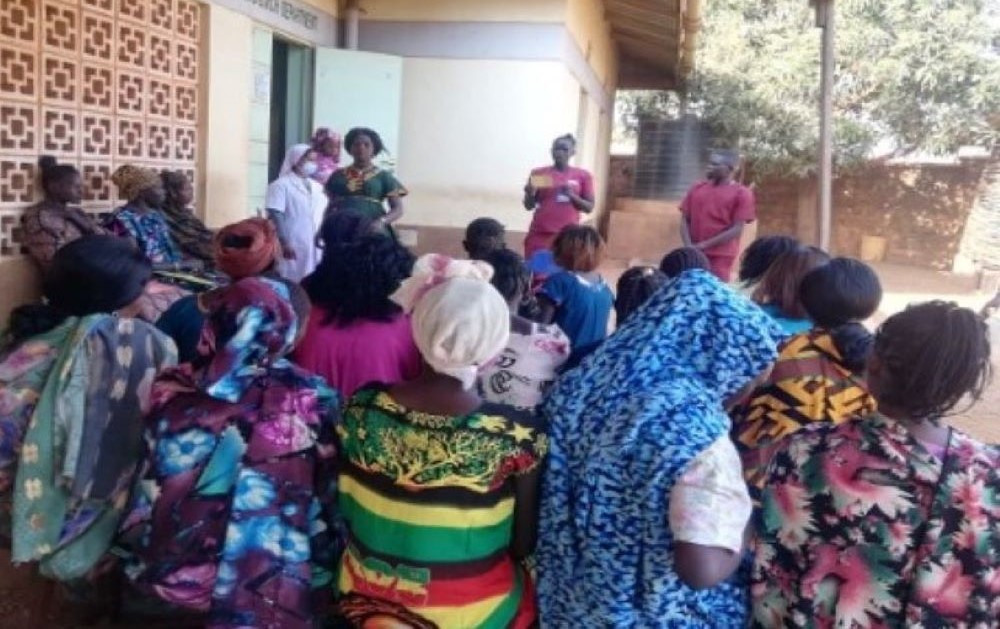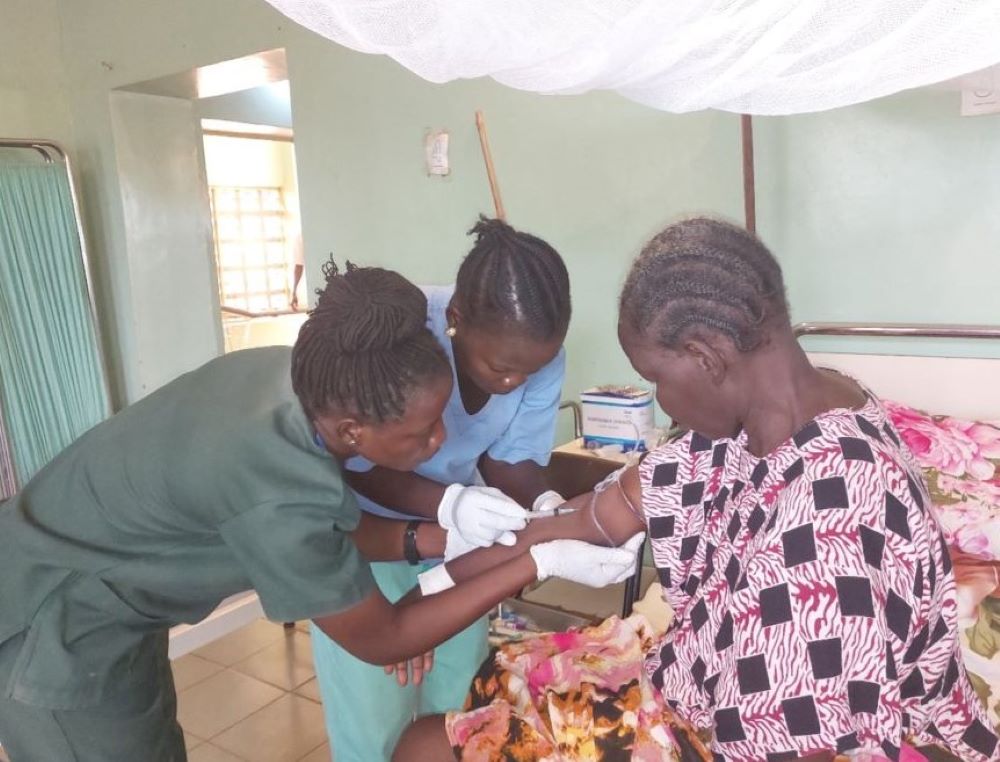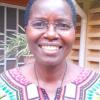
A Catholic Health Training Institute nurse trainee takes a practical exam at St. Daniel Comboni Catholic Hospital, with Sr. Bindhu George, a gynecologist and principal at the Wau, South Sudan college. (Courtesy of Scholasticah Nganda)
Defying all odds, the Catholic Health Training Institute in Wau, South Sudan, remains a small beacon of hope in a nation struggling to recover from both old and new wars. CHTI offers male and female students a three-year college diploma in nursing and midwifery.
CHTI is staffed 95% by national personnel, while a small minority are expatriates, mainly from Solidarity with South Sudan, a group of intercongregational male and female religious. The college is run by SwSS under the Sudan/South Sudan Catholic Bishops Conference. SwSS, an initiative of the International Union of Superiors General and the Union of Superiors General, has operated in South Sudan for the last 15 years.
Since gaining independence in 2011, South Sudan, a country of more than 11 million people, has endured a terrible civil war and the displacement of millions. More recently, 588,000 Sudanese returnees have fled the war in the north, seeking safety in South Sudan. There are at least 2.2 million internally displaced persons in South Sudan, and more than 2.3 million South Sudanese are refugees in neighboring countries, according to the United Nations. South Sudan is a country with a population in flux and basic health and education infrastructures not yet fully established.
There is a growing health care industry in South Sudan, but the government is struggling to maintain control over the quality of training for these professionals. Currently, 12 health training institutes operate in the country, with plans to open six more in 2024. Since opening in 2009, CHTI has trained 324 health care professionals, all of whom are working in clinics, dispensaries, and hospitals across South Sudan and the Nuba Mountains (Sudan). While this number may seem small, it reflects the institute's commitment to training people to the highest professional standards. Many of these nurses and midwives now work in under-resourced and under-supervised health centers, where their greatest asset is the training they received.
CHTI’s reputation as the best college of nursing and midwifery in South Sudan challenges its staff to always go the extra mile. Students are fully aware of the responsibility placed upon them, having been selected from each of the seven Catholic dioceses of South Sudan and the Nuba Mountains for a program that empowers them with the necessary skills. At each graduation ceremony, newly qualified nurses and midwives are reminded they are "beacons of hope" for the sick, who often come to health centers in desperation.

Catholic Health Training Institute midwifery students giving a health talk to expectant mothers in St. Daniel Comboni Catholic Hospital in Wau, South Sudan. Since opening in 2009, CHTI has trained 324 health care professionals, all of whom are working in South Sudan and the Nuba Mountains (Sudan). (Courtesy of Scholasticah Nganda)
CHTI's status as a beacon of hope for South Sudan is not a far-fetched dream, but a living reality. This hope is nourished by the unwavering support of Solidarity's donors across the globe, the dedication of religious congregations missioning personnel to South Sudan, and the commitment of lay missionary associates. Over the past 15 years, Solidarity has received tremendous support from stakeholders, allowing the initiative to thrive. Solidarity members ministering at CHTI believe passionately in the transformative power of training nurses and midwives for South Sudan. This initiative holds the hope of improving health care services in a nation yearning for change.
Advertisement
CHTI is not only training young professionals for health care service, but also shaping a transformative vision for day-to-day living in South Sudan. The institute aims to offer an education that empowers students to dream of a better South Sudan, a country torn apart by ethnic divisions at every level. CHTI's approach to capacity building is holistic, providing students with both health care skills and environmental knowledge, in line with Solidarity's mission to mainstream Laudato Si' into all activities. The college has expanded its organic vegetable farming to ensure fresh produce for students, and its farm workers have undergone in-service training on new methods of farm management and pesticide control.
Recognizing that diversity fuels creativity, CHTI has implemented an admission policy that promotes unity among students, countering the ethnic divisions that have plagued South Sudan. CHTI admits students based on merit from all 10 states of South Sudan and the Nuba Mountains, regardless of tribe, religion or denomination. This diversity provides a range of perspectives and fosters a unity not often found in students' home villages.
Admitting students from all Catholic dioceses of South Sudan creates a chorus of unique voices. Together, these young people create a united melody not found in their home villages. This diversity offers new perspectives, with the educated youth embodying open-mindedness and representing the bright future of South Sudan. CHTI graduates continue to play a vital role as health care professionals across South Sudan and the Nuba Mountains, contributing to the nation’s transformation.

A Catholic Health Training Institute nurse trainee attends to a patient in a clinic in Wau, South Sudan. The institute is run by Solidarity with South Sudan under the Sudan/South Sudan Catholic Bishops Conference. (Courtesy of Scholasticah Nganda)
Our young professionals are inspiring other youth to dream of a united South Sudan where dignity, equity and unity are the hallmark of nation-building. In such an environment, individuals are respected, and communities are empowered.
At CHTI, we sometimes feel like we're standing alone in the storm, but many have helped us kindle the flame of hope needed in South Sudan. CHTI's vision of being a beacon of hope for health care services requires many hands to lighten the burden. While resources are limited, we believe we can transform nursing and midwifery education in South Sudan, bringing hope and change to many lives. Solidarity's CHTI project in Wau, South Sudan, is not just training nurses and midwives — we are changing lives, one step at a time. We believe our South Sudanese youth, through the power of education, will rekindle the hope, and shape a brighter future for the nation.
For more information on Solidarity Projects in South Sudan, go to: https://solidarityssudan.org.
Editor's note: The author wishes to acknowledge the contribution Fr. Jim Greene, executive director of Solidarity with South Sudan, made to this article.




